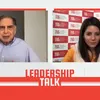[YS Learn] Three key learnings for startup founders from Ratan Tata
From empathy to ethical moneymaking, Ratan Naval Tata, Chairman of Tata Trusts, in an exclusive conversation with Shradha Sharma, Founder and CEO, YourStory, shared insights and learnings for founders.
The coronavirus pandemic is a crisis that few have been able to keep up with. Business models, channels, and methods are being put through the toughest of tests. Founders and leaders are facing a litmus test of their abilities and patience.
Bringing in personal anecdotes and experiences, Ratan Tata, Chairman, , in an exclusive conversation with Shradha Sharma, Founder and CEO, , shared key insights that founders can take away.

Empathy can go a long way
When the odds are stacked against you, empathy and honesty can turn things around for you. In 2008, just when Tata Motors acquired Jaguar Land Rover (JLR) for $2.8 billion in the UK, the economy had started to crumble. While a prestigious brand, Jaguar Land Rover was struggling as a business. For eight years, Ford Motors had tried to turn the company around but was unable to do so.
“In Coventry, where the plant was located, there were rumours that we were going to close down the factory and convert it into a tandoori chicken restaurant,” recollected Mr Tata. The then UK Government, barring the then Prime Minister Gordon Brown, weren’t supportive of Tata Motors. “The ministers said it was an Indian company and Indian banks’ problem.”
The only way ahead was to ensure that everyone worked hand-in-hand to revive the brand and the company. Mr Tata then headed an all-hands town hall meeting. Recollecting that meeting 12 years ago, Mr Tata said,
“Standing there in front of a testy crowd of people I said – ‘I don’t know what we will do, but I know we do not wish to close down. We should work shoulder to shoulder and revive the two brands to the glory that they had at one stage.’”
Needless to say, the team developed the new products, took some of the downturns and got the company running.
“What did I do? I can only say I registered confidence in the people and the company repaid its purchase price twice over,” he added.
“In times of crisis, stand with your people and say you’re with them and will do what can and needs to be done. But do it together,” Mr Tata advised.
Create stakeholder value
Mr Tata in his interaction explained that it is important to not just create shareholder value but also stakeholder value.
“As a business leader, you have to face your shareholders and stakeholders. And there also are people who have to deliver the goods. You can’t stand there with a whip. You have to understand their position, and if they’re angry, there is a reason for that and you have to deal with that. So it is your responsibility to find solutions and work towards them,” said Mr Tata.
He recalled another major challenge he faced after he took over as the chairman of . There was a major strike at the Tata Motors plant, which turned violent, with workers beaten up and managers stabbed.
“I stayed for four days at the plant to say that we are together. We overcame the strike and started to work again,” he said.
When the factory resumed work, and it was time for the payment of the statutory bonus, the management was reluctant to pay the bonus due to the strike. However, Mr Tata said,
“The workers had nothing to do with it. These are the people who stood with us, we should pay the bonus. That one act came back again and again.”
Make money, but ethically
Business leaders need to evaluate their choices, their decisions, and themselves at the end of the day, and question if they made sound choices, even if they were hard.
“We're all looking for the spotlight whether we admit it or not; we want to be successful. The traditional means of gauging success is profits, and we want our story to be another success story which puts us in more money. Profits is not something someone can forget,” said Mr Tata.
But, he added, business is not just about making money — one has to do right to their customers and stakeholders, and they have to do that ethically. "We may make mistakes, and that's okay — you have to do the right thing at every point, and take the good with the bad, but you don't have to run away from difficult decisions," he advised.
"A company is traditionally viewed by the profits it makes, and that covers, shields, protects, and camouflages what's inside the company. It could be a happy, worthwhile environment, but it could also be a nasty environment. The financial and the business segment, unfortunately, more often than not look at the profit and the numbers, and view a company on that basis, rather than take a holistic view of whether employees are happy to work for the company, if the managers are being fair to employees," Mr Tata added.
What stands out is: Are you proud of your company? Do you deal with your customers in a fair manner? Is the management brave enough to rise to the occasion?
Edited by Kanishk Singh


![[YS Learn] Three key learnings for startup founders from Ratan Tata](https://images.yourstory.com/cs/2/a9efa9c02dd911e9adc52d913c55075e/Image98yl-1595586168477.jpg?mode=crop&crop=faces&ar=2%3A1&format=auto&w=1920&q=75)
![[Roundup] Takeaways from YS exclusive leadership talk with Ratan Tata](https://images.yourstory.com/cs/2/a09f22505c6411ea9c48a10bad99c62f/Imageijsl-1595509033837.jpg?fm=png&auto=format&h=100&w=100&crop=entropy&fit=crop)






